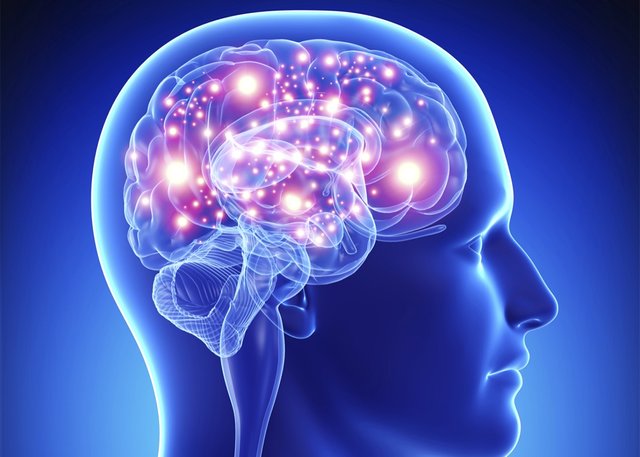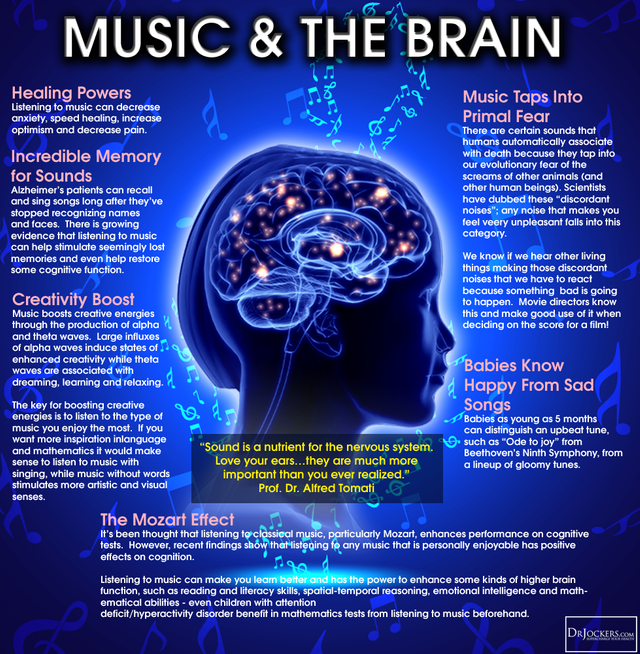The effects of music on our body.
How does music work on our body?
We all know the pleasure of music, but we do not always realize that its powers go far beyond the sweetness of the ear. It is a wave, a vibration, which resonates with our nervous system and gives rise to emotions, appeasement or stimulation reactions. It changes our mood and facilitates our homeostasis. It is known that it helps relaxation and the sweetness of life.
Extensive research into the physiological effects of music shows that it would act on our parasympathetic nervous system, which in some way behaves like a natural protector of our organism by preventing our sympathetic nervous system , its twin brother, from racing. Its effects are felt by a slowing of our respiratory and cardiac rhythms, a decrease in blood pressure, muscle relaxation and the establishment of a state of calm.
The action of music touches the limbic system where the keyboard of our emotions is. The rhythm, the tone and the intensity of the sounds thus stimulate our emotional reactions and bring us a well-being promoting the calm, the balance and the evolution towards an improvement of our physical and psychological state, when it is necessary and possible
"There is music in the sigh of the reed; There is music in the bubbling of the stream; There is music in all things, if men could hear it. George Gordon, Lord Byron, Extracted from DON JUAN
Definitions:
- Limbic system : Set of areas of the brain known to play a role in the olfaction, memory and regulation of emotions. All the zones which constitute it are situated towards the base of the brain, around the thalamus: septum, fornix, hippocampus, amygdala, insular cortex and fronto-orbital posterior.
- Parasympathetic nervous system : The parasympathetic system is one of the three divisions that constitutes the nervous system, it is responsible for the slowing of the heart rate (cardio-moderator), the increase of the digestive secretions. It is involved in certain pathological phenomena, such as fainting or "vagal discomfort", colitic phenomena (colitis), diarrhea, vomiting, tears, etc.
- freindly nervous system : the sympathetic nervous system corresponding to the development of the body alert and preparing to physical and intellectual activity. It constitutes the nervous system. The sympathetic nervous system controls a large part of the unconscious (autonomous) activities of the human body, such as heart rate and contraction of smooth muscles.
Music and its effect on breathing and blood pressure
Some physiological responses are strongly influenced by music, including breathing and blood pressure. Indeed, an intimate relationship is established between stress, breathing and music that acts to slow down and a reaction to lower blood pressure.
But it is the musical rhythm rather than the style of music that influences the breathing and the cardiac system.A slow rhythm will cause deeper breathing, which at the same time decreases the heart rate and blood pressure. A faster musical beat would have the opposite effect. It is thus demonstrated that the hearing of soothing melodies of stress, coupled with slow abdominal breathing, causes, with practice, a reduction of blood pressure.
Less stress in music
Music, acting on the nervous system, helps to relax and reduce tension. It lowers the cortisol hormone, a corticosteroid hormone secreted by the cortex of the adrenal gland and responsible for stress among other things.
According to his research, the English researcher Karageorghis argues that music improves good mood (joy, force for example) and tempers bad mood (tensions, depression, nervousness for example).
Scientific studies confirm it: music has positive effects on our body
If it is recognized that it softens the mores, the music would have many other beneficial virtues. Some music and sounds have a relaxing, refreshing power and can help concentration, improve performance and physical abilities. The music, by diverting the attention of the sportsman, can even make forget the fatigue and the pain.
Music and sports performance
Several scientific studies reveal that music can have a favorable impact on sports performance. Music decreases feelings of discomfort that result from physical activity, increases tolerance to effort, helps concentration and mental preparation.
This observation is particularly interesting in endurance sports where music has considerable positive effects for the average athlete. This effect is less conspicuous for the top athlete.
In a study conducted at the University of Brunel in England on 20 men of 20 years running the 400 meters in the sprint. The researchers highlighted the beneficial action of music on the performance of runners. The results are essentially the same as the music is synchronized, ie repetitive and in the same rhythm as that of the effort, or not (in this case, the sportsman listens to the music in the background during the exercise without any particular effort to stay in the rhythm).
In the context of long-term efforts, other studies support this same hypothesis that music improves performance. Rhythm appears to be a more important factor than other components of the music, for example, knowing the song being listened to.
Music and concentration
Music stimulates creativity and improves cognitive abilities (attention, memory). By being a barrier to surrounding noise, it can promote concentration. However, be careful with the musical choice: the known songs can encourage to hum the melody, beat the rhythm and thus divert the attention.
In sports, music can contribute to effective help for mental preparation that precedes an event.
Music helps reduce pain
Relaxing music releases endorphins , substances with an anti-pain role secreted by the brain and which have analgesic, soothing and euphoric properties.
In addition, captivating and pleasant music diverts attention and defocuses it from pain.
Definition Endorphins: Endorphins are substances naturally synthesized by the body. These are cells located in the hypothalamus and pituitary gland that are responsible for their secretion.
They have analgesic (painkiller) properties equivalent to those provided by morphine. In other words, an endorphin would be the equivalent of a natural morphine.
Endorphins consist of a small amount of amino acids. The number of amino acids constituting these peptides is variable, but all are characterized by a sequence consisting of five identical amino acids, necessary for their action.
Endorphins are divided into three groups that are differentiated by their protein precursors, encoded by different genes:
Enkephalins consisting of five to eight amino acids.
Neoendorphins and dynorphins formed from eight to sixteen amino acids,
The beta-endorphin consists of thirty-one amino acids.
Mechanism of the action of music on the man.
The music acts on the body through melody, harmony, orchestral mass and rhythm.
The melody, or sequence of tones (tones, notes) or tune of the song, is perceived by the right brain which can conceive an aesthetic pleasure, acting on the mood and conditioning, it seems, the sensitivity of a people. Until the eighteenth century, France was renowned champion in the field of melody. Since his musical taste is discussed ...
The harmonic dominant, depending on the relations between the high and low sounds, their codification, allows to combine several melodies together producing a pleasant effect for the European sensibility (baroque music). The harmonic part of music is perceived by the analytic function of the left brain; it provokes awakening and is reputed to develop the intellect, by increasing the IQ (intelligence quotient).
The orchestral mass, or sound power of musical instruments. The law recognizes that sounds are dangerous to the ear above 85 decibels. But listening to "young music" and "new music" is often done in a sound atmosphere of more than 120 decibels (rock concerts, discotheques, walkman). Also deafness (generally partial) is in continuous growth in Western countries despite the warnings of the medical profession. Because we have succeeded in inculcating people that the ideal youth must love noise and violence.
Rhythm, or periodic sequence combining long elements and short elements (white and black notes or dance movements). It can be produced either with beats of the tam-tam or any other drum percussion instrument or by the synthesizer that imitates these percussion instruments, these simplistic processes punctuate so-called "young", "new" or "new" music. modern "by the tonal and harmonic combination of sounds from several musical instruments (violins, trumpets and harp, for example). This last type of rhythm, obtained without the intervention of any percussion instrument, is that of the European music par excellence.
To conclude, music acts in our parasympathetic nervous system and affects our limbic system, it brings many effects on the body with changes (increase or decrease) in blood pressure, heart rate, stress, physical performance , concentration, pain and stimulation of our emotional reactions. These responses can be influenced by the musical style (eg, classical, rock ..), melody, harmonic structure, rhythm and tempo.



Hello @thaphyx
I've always known music just has a way of calming me down, especially when i am really upset.
I never bothered to look up the reason why this is so.
Thank you so much for sharing this great info.
Cheers and steem On!
thanks so much